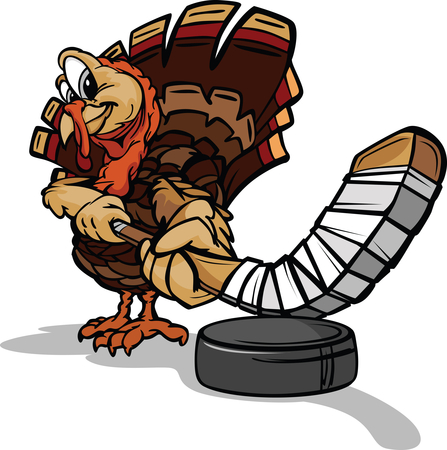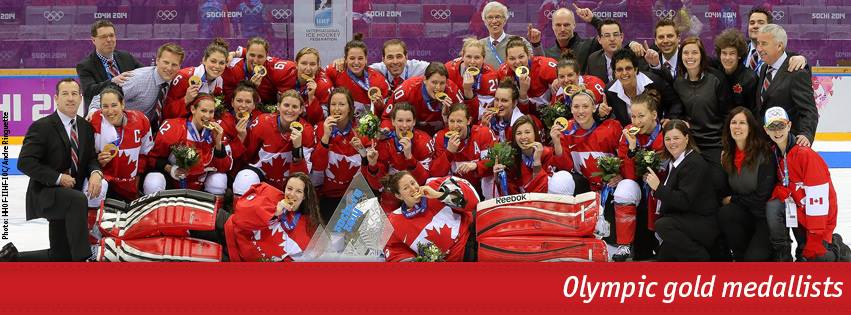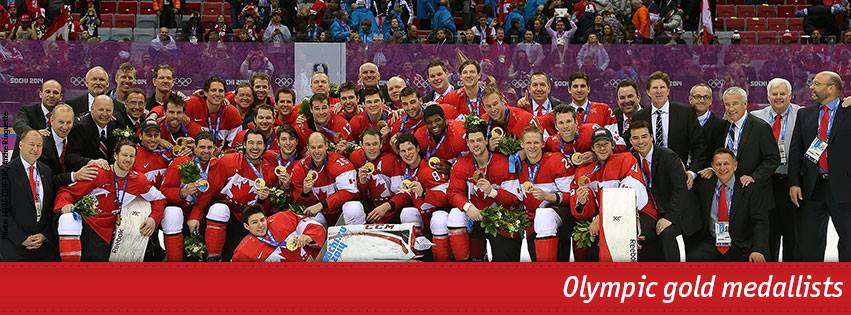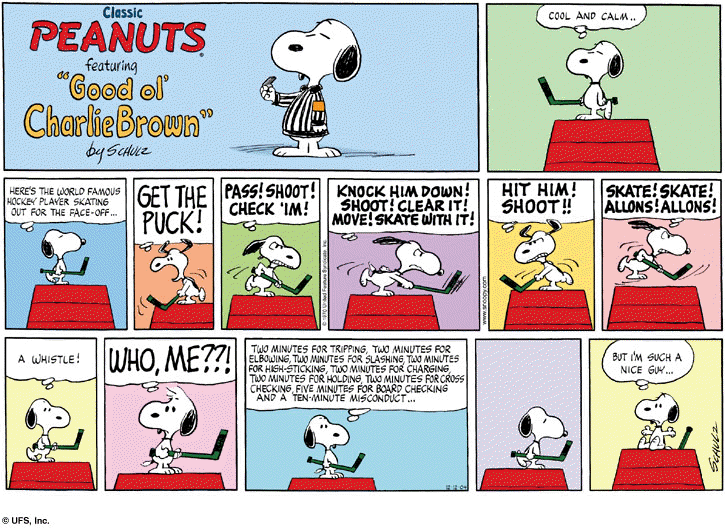 On the heels of my minor hockey politics rant, I thought I should get back to a more positive tone and spend some time giving thanks to those who have helped coach, raise and nurture our two players over the last 15 years or so. Feel free to break out the turkey and fixings if you’re so inclined. They say it takes a village to raise a child. This certainly applies when it comes to hockey and our family. Here are some of the folks who deserve to be recognized for their contribution in ways, both large and small, to our children’s development as athletes and well-rounded members of society.
On the heels of my minor hockey politics rant, I thought I should get back to a more positive tone and spend some time giving thanks to those who have helped coach, raise and nurture our two players over the last 15 years or so. Feel free to break out the turkey and fixings if you’re so inclined. They say it takes a village to raise a child. This certainly applies when it comes to hockey and our family. Here are some of the folks who deserve to be recognized for their contribution in ways, both large and small, to our children’s development as athletes and well-rounded members of society.
Coaches – Our kids have had the very good fortune of being mentored by many fine coaches who Momma and I, to this day, hold in high regard and to whom we owe a sincere debt of gratitude for teaching our kids important sport and life lessons. For instance, the Boy was directed by an excellent coach early in his development as a player to always strive to make those he played with better. We continued to reinforce this message to both he and the Devil as they progressed through their hockey careers and what better lesson could a person ask for when working in any team environment? Teachings like these about teamwork, competition, resilience, perseverance, winning gracefully and losing respectfully were professed and picked up all along the way to the credit of the instructors.
I also need to specifically thank a few people who’ve selflessly donated their non-hockey parent time to help with my own coaching efforts over the last few years. I highly recommend having non-hockey parents as part of a coaching staff if you can beg/plead/convince someone to do it as it serves to cut back, albeit not eliminate, griping from parents who feel coach’s kids get preferential treatment. Between practices, games and travelling to and fro we are talking upwards of 300 hours of time spent over a 7-8 month season. I am certain these hockey helpers also benefit from giving back to the game and interacting with the players, but the commitment of their time cannot be easily repaid.
Other Hockey Dads and Moms – Transportation is a key component of living in a minor hockey village. We’ve driven each others’ kids to and from rinks near and far for practices and games (though Momma and I can count on one hand how many times one of us was not present at a game, in fear of it being THE ONE GAME where our kid got hurt). Anyone who waited for the Boy to get out of a dressing room after a practice or game (speedy departures are not his strong suit) is truly appreciated.
One particular memory worth sharing here involved the Devil begin given a ride by another family back to a hotel our team was checking into for a weekend tournament. For some reason, Momma and I were trailing behind so the Devil and one other teammate would be hanging out in a third teammates’ room for a short while. After being allowed to check in at the front desk earlier than the hotel had anticipated, the three young (I believe 10 year oldish) girls ran up to check out the hotel room. When they arrived they found the door curiously ajar, but ran in all the same. Inside they happened upon two hotel employees who also had not anticipated early guests and we’re apparently pre-emptively testing the strength of the bed springs. Suffice it to say, the girls and hockey parents were mortified. One quipped later, “All I could see were the sheets going up and down.” The room was upgraded by the hotel, complete with a fruit basket and champagne, but no one is quite sure what happened to the less than opportunistic bed testers. As usual, I have no recollection of how the girls fared in their hockey tournament on this particular weekend.
Momma and I are lucky to have made some great hockey parent friends for which we owe thanks to the game. Friends with whom we can now recollect the good times and commiserate with when we miss the rink (and not the politics).
Family and Friends – We all appreciate the friends and family who’ve taken time to come to rinks to cheer on the Devil or the Boy in their games. Those who’ve likewise provided the transportation to arenas when needed or have even put our family up for the night to save a hotel charge or two during a tournament on the road. I’m fairly certain both kids got a little extra boost in their stride or snap in their shot when grandparents, uncles, aunts or friends were in the stands cheering them on. We’d like to think our extra hockey fans had as much fun as we did. I’m pleased to report both kids graciously and without fail said “Thanks for coming!” post-game to any and all who attended, regardless the outcome of the contests.
Teammates – Both the Boy and the Devil have made a bunch of friends over the years through the game and will no doubt continue to do so in their respective intramural and beer leagues down the road. Social interaction and friendship are at the heart of why we’ve encouraged them to play from the beginning. Some will be lifelong friends, while others will no doubt simply be remembered as hockey buddies. The Devil, via some unfortunate circumstances, lost a hockey friend this season, but I’ve chosen not to dwell on negatives here so that is all I have to say about that.
I played minor hockey over 30 years ago and can still recall a few of those same sorts of buddies along with the stories revolving around them. Important memories methinks and ones the Devil and Boy should hold close if they don’t already.
A Whole Bunch of Volunteers – Despite the tone of my last post on hockey politics, there are still many virtuous volunteers who devote several hours of their time to the game and its participants for all the right reasons. People who’s dedication to hockey should not be tarnished by the intentions and actions of a few. Just as hockey parents in general are all too often painted with a brush tainted by a couple of stereotypical (i.e. idiotic) incidents. We should and must have faith in the game prevailing regardless and it will in age-old arenas, on frozen ponds and outdoor rinks everywhere.
Rink Rats – While they are usually paid, as they should be, by a town or city to provide a service, I’ve noted a few arena staff over the years who have gone above and beyond monotonously driving the Zamboni around in circles to enhance the hockey experience if even in some small fashion.
For instance, there is one Zamboni driver at a nearby rink whom I’ve noted maintains a very well-groomed waxed moustache ala Yukon Cornelius and who has his own relatively unique method for flooding the ice. Instead of the typically driving around in circles, he takes the time to cut two swaths through the middle of the offensive zones in each end of the rink. I am not certain and I’ve been remiss in not asking, but I assume this is because he wants to ensure those prime shooting areas are fully frozen when the puck is dropped to start the game. This attention to detail for a peewee or younger girls’ hockey game must be commended.
Props also have to be given to those who’ve let us step on or off the ice well before or after we were supposed to so enthusiastic young players could get in a few more laps or practice their burgeoning slap shots. There are always a few willing participants who would like nothing better than to suck every second they can from their frozen playground.
Referees – These men and women are certainly owed a debt of gratitude for all the crap they take (admittedly including mine on occasion) from parents, coaches and players. Hockey is quite often a passionate game, played and watched by passionate people. If it wasn’t there would probably be far less participants. Referees willingly put themselves right in the middle of it all.
From my experience, the best referees have been the ones who’ve taken extra time after whistles and before puck drops to help teach the game. Those who’ve dropped to a knee to explain to unaware novice players exactly why they blew the whistle signalling some sort of infraction; with offside being the most confounding concept for many young participants who will wander aimlessly around in an offensive zone while parents and coaches implore them to “CLEAR” at the top of their lungs.
I recall one older gentleman in particular who refereed both the Boy and the Devil when they were much younger. I would guess him to be around 70 and could tell skating was no longer as effortless as it may have once been for him meaning he likely could not keep up with older players, which is a shame. He would, before or sometimes during each contest, take time to chat with coaches on the bench, sincerely wishing each a good game or commenting on a particular play. You could tell he loved being on the ice with the kids. And he would, more often than not, take a young player aside to explain a call he’d made or simply provide encouragement. I don’t know if he still refs as I haven’t seen him at a rink or watched any younger players’ games lately, but thanks to him and many of his fraternity for what they add to hockey.
Opposing Players, Coaches and Parents – Competition is also at the core of hockey, as it is with any game. Here too passion interjects and provides opportunity, or more so fuel, for less than saner heads to prevail. However, for the most part, when the final whistle blows there are obligatory handshakes, “Good Game”s and wishes of good luck. Most coaches and parents have taught their players to put respect at the forefront. I think one of the most heartening things to hear as a coach is “You have a classy team” and we’ve had the good fortune of playing against several who fit this description.
Our Very Own Hockey Momma – My life mate and I have shared a common and undeniable bond when it comes to the pride and joy we’ve received from experiencing hockey with our kids; often in opposite directions and different physical locations. We became, out of necessity, quite adept at texting play-by-play to ensure the other did not miss out on a special pass, hit, g0al or victory.
Our Momma got way involved in the game as a manager, trainer, association executive and even briefly as a player. But, first and foremost she’s been a devoted hockey momma, screaming “Heeeeeeeeeyyyyyyyyyy!” when somebody took what she thought was a cheap shot at her Boy or “Atta Girl!” when the Devil managed to dipsy-do around a defender or bewildered keeper.
Momma’s exchanged a few sun-filled vacations and nights on the town for eight-month’s worth of registration fees and evenings at the arena. Traded glasses of Pinot Grigio paired with Surf and Turf from The Keg for Extra-Large Cream Only’s and Everything Bagels with Herb n’ Garlic Cream Cheese from Timmies. And if you ask she’ll tell you she wouldn’t have changed a thing; nor would I.
The Boy and the Devil – Simply put…the singular reason we’ve driven all over Hell’s Frozen Half Acre for 15+ years to stand in bone-chilling barns watching practices or games. I thank my kids for their commitment, perseverance and dedication to hockey played in those very same conditions.They haven’t just played hockey…they’ve lived it. Of course, none of this would have happened without them having developed a keen, shared love for the sport.
Two years out of minor hockey the Boy occasionally hints at how much he misses the regularity of playing competitively. As recently as yesterday, he fervently told the story of a university intramural game he just played against a “really good” team. In this match, he personally managed to garner two assists and he excitedly recalled watching his goalie “stand on his head” in a 3-0 victory. Yeah, he definitely still loves and has passion for the game.
As noted previously, the Devil’s had a pretty rough hockey year in returning from a broken leg to play on a challenging team. Yet, she’s continued to follow me out to the rink for late night practices over the last month despite a lack of any meaningful competition or a real need to practice. I get the feeling this is more to placate her dear old hockey coach/dad as her lack of effort is obvious and understandable. I’m hoping her passion for the game is re-ignited when she enters the next phase of her life at university and beyond; otherwise I will have failed in my quest to make sure none of the players I’ve coached ever lost the flame.
With one official minor hockey practice/scrimmage left for the Devil, I can faintly hear organ music signalling the end of an era or maybe it’s just my own melodramatic nostalgia kicking in again. Regardless, I’m gonna miss this. Sincere thanks again to all who’ve made it a grand, memorable life experience.
#imahockeydad



